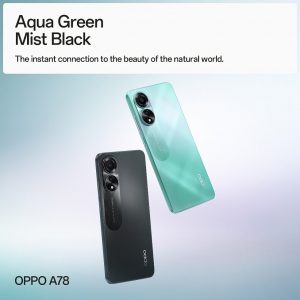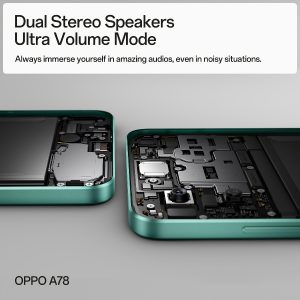Business
OPPO unveils new A78 with superior technological capabilities

OPPO unveils new A78 with superior technological capabilities
OPPO today announced the launch of the new OPPO A78 in Nigeria. Featuring significant upgrades with its FHD+ AMOLED Display, Dual Stereo Speakers, lightning-fast 67W SUPERVOOCTM flash charge and long-lasting 5000mAh large battery, intelligent and secure ColorOS 13.1 and more. The A78 is built to deliver seamless and smooth performance for up to four years. Enhancing this exceptional performance is a visually stunning Ultra-Slim Retro Design with an industry-first Diamond Matrix Design on the back cover, making the phone an absolute standout in style and functionality.
Lightning-fast and reliable charging with a longer-lasting battery
With the composition of the super-fast 67W SUPERVOOCTM Flash Charge and a large 5000mAh battery, the OPPO A78 offers one of the fastest flash charging speeds on any smartphone in its price range. The A78 can be fully charged in just 44 minutes. With this incredible charging speed, it’s even possible to charge the phone to last an entire flight with a quick, last-minute charge before boarding a plane. When fully charged, the long-lasting 5,000mAh battery can provide 27.4 days of standby (flight mode) or 16.37 hours of YouTube video, so it can easily last an entire day of average use.
OPPO has also introduced a series of exclusive technologies designed to enhance charging safety and reliability on the A78. OPPO’s Battery Health Engine helps to extend the A78’s battery lifespan to as many as 1,600 charge and discharge cycles, which is enough to keep the battery working in a good condition for up to four years. Optimized All-Day Charging intelligently learns users’ daily charging habits and adjusts the charging speed accordingly. For office workers who often leave their phones connected to a charger throughout the day, Optimized All-Day Charging can automatically stop charging the battery when it reaches 80% capacity and then resume charging to 100% just in time for the end of work. This reduces constant charging of the battery to improve safety and overall battery longevity. On top of this, 5-Layer Charging Protection returns to the A78 to improve end-to-end safety across the entire charging process.
A more immersive audio-visual experience
The OPPO A78 is the first OPPO A series phone to feature an FHD+ AMOLED screen that can be rarely seen in its price range. The 6.4” screen has a 90Hz refresh rate and up to 180Hz touch sampling rate to provide enhanced smoothness and responsiveness. With up to 600 nits’ overall brightness, the screen delivers incredible detail even in direct sunlight, while the smart adaptive backlight helps provide the most comfortable visual experience in different environments to reduce visual fatigue from prolonged viewing. The display also includes the first In-Display Fingerprint Unlock on a smartphone at this price range, offering a better balance between aesthetic design and efficiency.
Alongside the fantastic visual experience, the A78 provides more immersive and crystal-clear surround sound through its Dual Stereo Speakers and Real HD Sound 3.0, delivering optimal sound adjusted for different scenarios such as music, video, and gaming. For users who like to turn things up a notch, Ultra Volume Mode can boost sound volume by as much as 200%, making it easier to hear music or the phone ringing in even the noisiest of places. When making voice calls, the earpiece volume can be further increased by 3dB without impacting audio quality, so users can clearly hear their conversations at all times.
In terms of camera, the A78 is equipped with a camera system including a 50MP main camera and a series of new features that make it easier than ever to capture stunning photos and videos. For example, Dual-View Video can be used to shoot from both the front and rear cameras simultaneously and combine the footage into a single frame, unlocking new perspectives in shooting creative vlogs.
Stay smooth for up to four years
The A78 is powered by the Snapdragon® 680 Mobile Platform, delivering powerful performance with optimized power consumption built for everyday tasks. The phone features an 8GB RAM + 128/256GB ROM configuration with up to 1TB of additional storage through the SD card slot. It also includes OPPO’s RAM Expansion technology, which can be used to temporarily convert free ROM space into a maximum of 8GB of RAM to keep the phone running smoothly during heavy-load scenarios.
At the system level, OPPO’s self-developed Dynamic Computing Engine uses parallel computing technology to optimize the scheduling and recovery of computing resources to boost overall speed and stability. On the A78, the Dynamic Computing Engine can increase app opening speeds by as much as 1.42%. It also helps to keep up to 19 apps running in the background at the same time without any noticeable lag.
Thanks to all these optimizations, the A78 provides silky-smooth performance for up to four years, ensuring users can enjoy a longer-lasting smooth experience compared with other smartphones at a similar price point.
An enhanced Ultra-slim Retro body with industry-first Diamond Matrix Design
The A78 is available in two fresh, trendy color finishes – Aqua Green and Mist Black. Inspired by water, the Aqua Green A78 uses a double-layer process to superimpose an industry-first Diamond Matrix Design atop a water green base layer. The result is a vibrant, energetic color that sparkles like diamonds floating on a delicate surface of jade water to create a uniquely exquisite appearance. Mist Black meanwhile adds a touch of yellow-green to a pure black color base to introduce a sense of dimensionality to the phone.
The A78 inherits the same iconic Ultra-Slim Retro Design as previous models in the OPPO A series with the introduction of several new upgrades. The 2.5D right-angled middle frame and smoothed edges give the phone an integrated sleek and lightweight appearance while also making it more comfortable to hold. Even with its large 5000mAh battery, the A78 continues the same slim and lightweight design of the Reno series, measuring as little as 7.93 mm in thickness and weighing only 180 g to make it the thinnest phone with a 5000mAh battery in its price range.
Alongside these design upgrades, the A78 also features enhanced quality and durability. The phone has been put through some of the most rigorous durability tests in OPPO’s lab to make sure that it is ready to stand up to the challenges of everyday life. It is also rated IP54 waterproof, meaning it won’t be phased by regular splashes and spills.
A smarter and more private ColorOS 13.1
ColorOS 13.1 on the A78 is designed for enhanced convenience and privacy. Among the new features in the latest ColorOS is Screen Translate, which uses Google Lens to translate the content of an entire screen with just one click from the sidebar. With support for intelligent translation between 105 languages, Screen Translate can even be used to translate image-based text. Auto Pixelate can automatically recognize and pixelate sensitive information like profile photos and names on chat screenshots with just one click.
Further to this, ColorOS 13.1 includes an updated Private Safe that has been upgraded with the Advanced Encryption Standard (AES) to keep private files encrypted and stored in a private directory with a higher level of security. 5-Grade Access Control has also been added to give users complete control over who can see their data and when.
OPPO A78 device is available for purchase at authorized retail stores across the country from N188,000. OPPO A series has developed a reputation over the years for offering great features at accessible price points and this Qualcomm CPU-powered device is not different.
Bank
Alpha Morgan to Host 19th Economic Review Webinar

Alpha Morgan to Host 19th Economic Review Webinar
In an economy shaped by constant shifts, the edge often belongs to those with the right information.
On Wednesday, February 25, 2026, Alpha Morgan Bank will host the 19th edition of its Economic Review Webinar, a high-level thought leadership session designed to equip businesses, investors, and individuals with timely financial and economic insight.
The session, which will hold live on Zoom at 10:00am WAT and will feature economist Bismarck Rewane, who will examine the key signals influencing Nigeria’s economic direction in 2026, including policy trends, market movements, and global developments shaping the local landscape.
With a consistent track record of delivering clarity in uncertain times, the Alpha Morgan Economic Review continues to provide practical context for decision-making in a dynamic environment.
Registration for the 19th Alpha Morgan Economic Review is free and can be completed via https://bit.ly/registeramerseries19
It is a bi-monthly platform that is open to the public and is held virtually.
Visit www.alphamorganbank to know more.
Business
GTBank Launches Quick Airtime Loan at 2.95%

GTBank Launches Quick Airtime Loan at 2.95%
Guaranty Trust Bank Ltd (GTBank), the flagship banking franchise of GTCO Plc, Africa’s leading financial services group, today announced the launch of Quick Airtime Loan, an innovative digital solution that gives customers instant access to airtime when they run out of call credit and have limited funds in their bank accounts, ensuring customers can stay connected when it matters most.
In today’s always-on world, running out of airtime is more than a minor inconvenience. It can mean missed opportunities, disrupted plans, and lost connections, often at the very moment when funds are tight, and options are limited. Quick Airtime Loan was created to solve this problem, offering customers instant access to airtime on credit, directly from their bank. With Quick Airtime Loan, eligible GTBank customers can access from ₦100 and up to ₦10,000 by dialing *737*90#. Available across all major mobile networks in Nigeria, the service will soon expand to include data loans, further strengthening its proposition as a reliable on-demand platform.
For years, the airtime credit market has been dominated by Telcos, where charges for this service are at 15%. GTBank is now changing the narrative by offering a customer-centric, bank-led digital alternative priced at 2.95%. Built on transparency, convenience and affordability, Quick Airtime Loan has the potential to broaden access to airtime, deliver meaningful cost savings for millions of Nigerians, and redefine how financial services show up in everyday life, not just in banking moments.
Commenting on the product launch, Miriam Olusanya, Managing Director of Guaranty Trust Bank Ltd, said: “Quick Airtime Loan reflects GTBank’s continued focus on delivering digital solutions that are relevant, accessible, and built around real customer needs. The solution underscores the power of a connected financial ecosystem, combining GTBank’s digital reach and lending expertise with the capabilities of HabariPay to deliver a smooth, end-to-end experience. By leveraging unique strengths across the Group, we are able to accelerate innovation, strengthen execution, and deliver a more integrated customer experience across all our service channels.”
Importantly, Quick Airtime Loan highlights GTCO’s evolution as a fully diversified financial services group. Leveraging HabariPay’s Squad, the solution reinforces the Group’s ecosystem proposition by bringing together banking, payment technology, and digital channels to deliver intuitive, one-stop experiences for customers.
With this new product launch, Guaranty Trust Bank is extending its legacy of pioneering digital-first solutions that have redefined customer access to financial services across the industry, building on the proven strength of its widely adopted QuickCredit offering and the convenience of the Bank’s iconic *737# USSD Banking platform.
About Guaranty Trust Bank
Guaranty Trust Bank (GTBank) is the flagship banking franchise of GTCO Plc, a leading financial services group with a strong presence across Africa and the United Kingdom. The Bank is widely recognized for its leadership in digital banking, customer experience, and innovative financial solutions that deliver value to individuals, businesses, and communities.
About HabariPay
HabariPay is the payments fintech subsidiary of GTCO Plc, focused on enabling fast, secure, and accessible digital payments for individuals and businesses. By integrating payments and digital technology, HabariPay supports innovative services that make everyday financial interactions simpler and more seamless.
Enquiries:
GTCO
Group Corporate Communication
[email protected]
+234-1-2715227
www.gtcoplc.com
Business
BUA Group, AD Ports Group and MAIR Group Launch Strategic Plan for World-Class Sugar and Agro-Logistics Hub at Khalifa Port

BUA Group, AD Ports Group and MAIR Group Sign MoU to Explore Collaboration in Sugar Refining, Agro-Industrial Development, and Integrated Global Logistics Solutions
Abu Dhabi, UAE – Monday, 16th February 2026
BUA Group, AD Ports Group, and MAIR Group of Abu Dhabi today signed a strategic Memorandum of Understanding (MoU) to explore collaboration in sugar refining, agro-industrial development, and integrated global logistics solutions. The partnership aims to create a world-class platform that strengthens regional food security, supports industrial diversification, and reinforces Abu Dhabi’s position as a hub for trade and manufacturing.
The proposed collaboration will leverage BUA Group’s industrial and logistics expertise, Khalifa Port’s world-class infrastructure, and AD Ports Group’s operational experience. The initiative aligns with the objectives of the UAE Food Security Strategy 2051, which seeks to position the UAE as a global leader in sustainable food production and resilient supply chains. It also aligns with Nigeria’s food production- and export-oriented agricultural transformation agenda, focused on scaling domestic capacity, strengthening value addition, improving post-harvest logistics, and unlocking new markets for Nigerian produce across the Middle East, Asia, and beyond.

Photo Caption: L-R: Kabiru Rabiu, Group Executive Director, BUA Group; Cpt. Mohammed J. Al Shamisi, MD/Group CEO, AD Ports Group; Saif Al Mazrouei, CEO (Ports Cluster) AD Ports Group; Abdul Samad Rabiu, Founder/Executive Chairman, BUA Group; and Steve Green, Group CFO, MAIR Group
Through structured aggregation, processing, storage, and maritime export channels, the partnership is designed to reduce supply chain inefficiencies, enhance traceability and quality standards, and also create a predictable trade corridor between West Africa and the Gulf.
BUA Group—recognised as one of Africa’s largest and most diversified conglomerates, with major investments across sugar refining, food production, flour milling, cement manufacturing, and infrastructure- brings extensive industrial expertise and large-scale operational capability to the venture. MAIR Group will provide strategic support in developing integrated logistics and agro-industrial solutions, creating a seamless platform for production, storage, and distribution.
Abdul Samad Rabiu, Founder and Chairman of BUA Group, said:
“This MoU marks an important milestone in BUA’s international expansion and reflects our long-term vision of building globally competitive industrial platforms. Together with AD Ports Group and MAIR Group, we aim to develop sustainable food production and logistics solutions that strengthen regional supply chains and support the UAE’s Food Security Strategy 2051.”
He further added that, “This partnership represents not just a commercial arrangement but a strategic food corridor anchored on shared economic ambition, resilient infrastructure, and disciplined execution, reinforcing long-term food security objectives for both nations.”
A representative of MAIR Group added:
“This collaboration underscores our commitment to advancing strategic industries in Abu Dhabi and building integrated solutions that reinforce the UAE’s position as a global hub for trade, food security, and industrial excellence.”
A spokesperson from AD Ports Group commented:
“Our partnership with BUA Group and MAIR Group highlights Khalifa Port’s role as a catalyst for high-impact industrial investments. This initiative will enhance regional food security, strengthen global trade connectivity, and support Abu Dhabi’s economic diversification goals.”
This MoU marks a historic collaboration that combines world-class infrastructure, industrial expertise, and strategic vision, setting the stage for a sustainable and resilient food and logistics ecosystem that will benefit the UAE, the region, and global markets alike.
-

 celebrity radar - gossips6 months ago
celebrity radar - gossips6 months agoWhy Babangida’s Hilltop Home Became Nigeria’s Political “Mecca”
-

 society6 months ago
society6 months agoPower is a Loan, Not a Possession: The Sacred Duty of Planting People
-

 society5 months ago
society5 months agoReligion: Africa’s Oldest Weapon of Enslavement and the Forgotten Truth
-

 news6 months ago
news6 months agoTHE APPOINTMENT OF WASIU AYINDE BY THE FEDERAL GOVERNMENT AS AN AMBASSADOR SOUNDS EMBARRASSING












